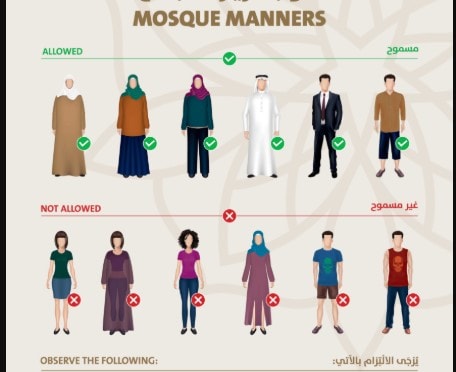
When Deepika Padukone and Ranveer Singh appeared in the new Experience Abu Dhabi tourism campaign, the focus was meant to be on the city's modern charm.
However, what caught the attention of some on the Internet were a few quiet seconds of Deepika walking through the Sheikh Zayed Grand Mosque in an abaya (not a hijab, by the way), with her head covered in respect for the holy site.
Supporters called it a graceful act of respect for local customs; while a section of social media, accused her of "selective sensitivity" and hypocrisy, citing her past feminist campaigns and wondering aloud why such reverence isn't shown for Indian traditions.
Ranveer's traditional look, featuring a long beard in parts of the ad, only fuelled more social media chatter.
But what are the mosque's visitor rules? Have a look
The Mosque's Visitor Rules
The Sheikh Zayed Grand Mosque Centre (SZGMC) is one of the world's most visited religious landmarks.
Its white marble domes and reflective pools attract millions each year, both worshippers and tourists. But the mosque makes its expectations clear, what it calls "Mosque Manners", for anyone stepping into its premises.
According to the official visitor code of conduct, mentioned on their site, the mosque is "a place of worship holding a sacred position for all Muslims", and all visitors must "abide by specific ethics and rules" as a sign of respect.
The Centre reserves the right to deny entry or remove anyone causing disturbance, misconduct, or breaching these duties.
Among the most emphasised sections are the dress regulations.
The Dress Code
To maintain the sanctity of the mosque, the guidelines specify modest attire that aligns with UAE customs. The mosque website explicitly mentions:
For women: "Women can select any type of women's attire, provided that they are loose-fitting to the ankles and have sleeves that go all the way to the wrists. Full hair coverage is also necessary while avoiding transparent, tight-fitting or revealing attire," the site reads.
"We kindly ask visitors to refrain from wearing excessive jewelry, heavy makeup, or vibrant colors."

Photo: Szgmc.gov
For men: "While men can select any type of men's attire; however, it is preferable to select clothing that covers the entire legs. Transparent, tight-fitting or sleeveless shirts should be avoided.
Btw, as of late 2024, visitors must either arrive in appropriate attire or purchase an abaya from the shops at the entrance.
These guidelines are not unique to Abu Dhabi. Most mosques around the world expect visitors, regardless of religion, to dress respectfully. At Sheikh Zayed Grand Mosque, the rules are simply formalised, ensuring a consistent sense of decorum in one of the largest mosques in the world.
Other Key Rules While Visiting
The mosque's code of conduct extends beyond dress. Visitors are prohibited from carrying inflammable items, lighters, fireworks, e-cigarettes, or sharp objects. Dolls, stuffed animals, flags, masks, and symbols of any kind are also banned.

Photo: Szgmc.gov
Displays of affection or any form of intimacy are strictly forbidden. The guidelines also remind visitors to keep calm, speak softly, and set mobile phones on silent mode. Food, drinks, and smoking are not allowed inside, and sleeping or lying down is considered disrespectful.
Photography is permitted only in designated areas and strictly for personal use. Commercial or professional shoots require prior permission. Visitors are also reminded not to lean, sit, or pose inappropriately within the prayer halls or courtyards, a rule that, if broken, has previously led to visitors being escorted out.
All borrowed items, such as audio guides or Qurans, must be returned in good condition. Parents and guardians are fully responsible for accompanying children or people of determination.
Track Latest News Live on NDTV.com and get news updates from India and around the world

